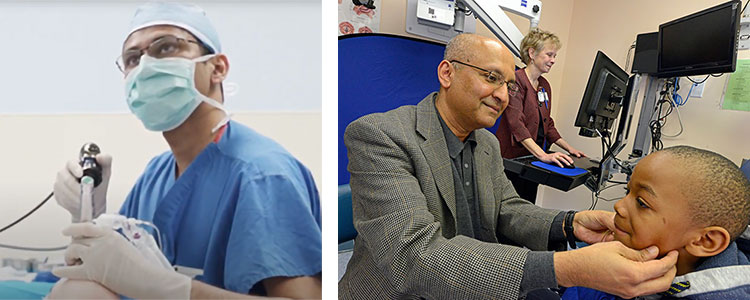Understand How Otorrinolaringologia Services Can Help with Hearing Loss
Understand How Otorrinolaringologia Services Can Help with Hearing Loss
Blog Article
Discovering the Field of Otolaryngology: What to Expect When You Get In Touch With an ENT
Otolaryngology, commonly described as ENT, includes the diagnosis and therapy of ear, nose, and throat problems. For those experiencing relevant concerns, consulting an ENT professional can supply clearness and relief. Comprehending what to anticipate during such assessments is vital for effective interaction and care. This overview will certainly outline vital elements of the ENT experience, consisting of common factors for sees and the procedures entailed in diagnosis and therapy.

Comprehending Otolaryngology: An Overview
Otolaryngology, frequently referred to as ENT (Ear, throat, and nose) medication, is a customized branch of medication that focuses on the diagnosis and therapy of problems impacting these important areas of the body. This area encompasses a wide variety of disorders, including those pertaining to hearing, balance, breathing function, and speech. Otolaryngologists are trained to take care of both surgical and clinical therapies, using innovative strategies and modern technologies. Their competence extends past typical conditions, attending to issues such as allergic reactions, sinus infections, and hearing loss. In addition, they play a crucial role in the management of head and neck cancers cells, supplying detailed treatment customized to specific patient requirements. Overall, otolaryngology remains vital for keeping health and wellness and lifestyle in affected individuals.
Typical Reasons to See an ENT Expert
Several people seek the know-how of an ENT expert for a variety of factors, mirroring the varied nature of conditions that impact the nose, throat, and ear. Usual concerns consist of persistent sinus problems, which typically brings about relentless nasal blockage and face discomfort. Allergic reactions and their linked symptoms, such as sneezing and itching, also prompt sees to these professionals (ENT Clinic). Hearing loss, whether gradual or unexpected, is one more substantial factor for assessment. Additionally, individuals might look for assessment for throat problems, consisting of persistent hoarseness or ingesting troubles. Rest apnea, characterized by interrupted breathing throughout rest, is frequently addressed by ENT specialists too. Each of these conditions highlights the value of specialized treatment in taking care of complicated ENT-related health concerns
Planning for Your ENT Consultation
When planning for an ENT appointment, it is vital to collect relevant details and think about any specific worries. Clients should assemble an in-depth medical background, including previous ear, nose, or throat problems, surgeries, and present medications. Recording symptoms-- such as regularity, period, and seriousness-- can give valuable insights for the ENT professional. In addition, individuals must prepare a list of questions they desire to ask, ensuring that all issues are dealt with during the visit. Bringing along any type of appropriate medical records or examination results can further aid the ENT in comprehending the patient's problem. Clients need to verify their consultation information, consisting of area, date, and time, to decrease any type of final confusion. Proper prep work can enhance the efficiency of the consultation and result in better outcomes.
What to Expect During the Examination
As the assessment starts, the person can expect to take part in a detailed discussion with the ENT professional concerning their signs and case history. The expert will ask about the duration, frequency, and severity of symptoms such as hearing loss, nasal congestion, or sore throat. In addition, the person's previous clinical conditions, medicines, and any kind of appropriate family background will certainly be assessed, helping the specialist in creating a total understanding of the client's health. The ENT might also inquire about way of living elements, such as direct exposure to irritants or irritants. This open dialogue establishes a foundation for the assessment, making sure that the person's concerns are dealt with and establishing the phase for any kind of essential analyses or recommendations for therapy.
Diagnostic Examinations and Treatments in Otolaryngology
A variety of analysis examinations and procedures are vital in otolaryngology to accurately evaluate and identify conditions impacting the ear, nose, and throat. Common tests consist of audiometry, which determines hearing feature, and tympanometry, assessing center ear pressure. Nasal endoscopy allows visualization of the nasal flows and sinuses, while laryngoscopy takes a look at the throat and singing cords. Imaging methods, such as CT scans and MRIs, offer detailed sights of head and neck structures. Allergic reaction screening may likewise be performed to recognize triggers for sinus or breathing concerns. These diagnostic devices allow ENT specialists to establish a detailed understanding of patients' problems, guaranteeing customized and reliable management strategies. Proper medical diagnosis is essential for effective treatment end results in otolaryngology.
Treatment Alternatives Offered by ENT Specialists
ENT professionals supply a selection of therapy choices read here tailored to resolve details conditions influencing the ear, nose, and throat. These treatments range from traditional approaches, such as medication and way of living modifications, to more intrusive treatments. Allergic reactions may be managed with antihistamines or immunotherapy, while chronic sinus problems could need nasal corticosteroids or sinus surgery. For hearing loss, ENT specialists commonly advise listening device or medical interventions like cochlear implants. In cases of throat disorders, alternatives can include speech treatment or operations to remove obstructions. In addition, they might give assistance for handling rest apnea, including the usage of CPAP devices or medical interventions. Generally, the goal is to improve clients' lifestyle via personalized care and efficient treatment techniques.
When to Seek Follow-Up Treatment With an ENT
Identifying when to look for follow-up treatment with an ENT specialist is crucial for managing recurring signs or problems connected to nose, throat, and ear conditions. Patients must consider arranging a follow-up consultation if symptoms continue regardless of first treatment, such as persistent ear pain, nasal congestion, or throat pain. Modifications in hearing, equilibrium issues, or uncommon nasal discharge might also necessitate additional assessment. Additionally, if a client experiences negative effects from prescribed medicines or has undergone a surgery, follow-up care is essential to monitor recovery and deal with any kind of problems. Timely assessments can ensure reliable management of problems, avoid possible issues, and offer assurance pertaining to one's health. Seeking follow-up treatment advertises proactive health and wellness monitoring in otolaryngology.
Often Asked Inquiries

What Qualifications Should I Search for in an ENT Specialist?
When seeking an ENT professional, one should try to find board certification, relevant experience, and solid client evaluations. Additionally, reliable interaction skills and a compassionate approach can greatly enhance the general treatment experience.
How Do I Pick the Right ENT for My Requirements?
Choosing the ideal ENT specialist includes evaluating their helpful hints credentials, experience, and individual reviews (Sinus). It is important to ponder their communication style and method to therapy, guaranteeing they straighten with the person's particular health needs and preferences
Are There Any Type Of Threats Linked With ENT Procedures?
The risks associated with ENT procedures may consist of infection, blood loss, anesthetic complications, and prospective damages to bordering frameworks. Patients must talk about these risks with their doctor to recognize private concerns and guarantee informed choices.
How Can I Manage Stress And Anxiety Prior To My ENT Visit?
To handle anxiousness prior to an appointment, individuals can practice deep breathing exercises, picture favorable outcomes, prepare inquiries in advance, and seek support from close friends or family, fostering a feeling of confidence and peace.
What Should I Do if I Experience Negative Effects From Therapy?
If side effects from treatment take place, the person needs to without delay report them to their healthcare service provider. Adjustments to treatment or additional treatments might be essential to guarantee safety and efficiency in managing their problem - ENT. As the assessment starts, the person can expect to engage in an extensive discussion with important link the ENT professional about their signs and symptoms and medical background. These diagnostic devices allow ENT specialists to establish a thorough understanding of clients' problems, ensuring customized and effective monitoring strategies. ENT professionals use a variety of treatment choices customized to resolve specific problems affecting the throat, ear, and nose. When seeking an ENT specialist, one must look for board qualification, appropriate experience, and solid person testimonials. Choosing the right ENT specialist involves assessing their qualifications, experience, and individual reviews
Report this page